Divergent: Christian Apocalypticism in Hollywood
As the Hunger Games give way to Divergent, American moviegoers turn their attentions to another dramatic, post-apocalyptic world full of ridiculously attractive teenagers. There are major differences between these two franchises, however, not the least of which is Divergent‘s reliance on religious allegory to craft its narrative. Of course, author Veronica Roth isn’t using just any old religious allegory, but the be-all, end-all: Christian Apocalypticism.
There is an apocalypticist element in almost every major religious tradition. Put simply, apocalypticism occurs when doctrine states that a religion’s goals will only be truly realized with the end of the world. Christian Apocalypticism, then, refers to the belief that Jesus Christ will return to rapture his followers up to Heaven while leaving the godless heathens on Earth in the clutches of the Antichrist. Ultimately, Christ returns to recapture the Earth for the faithful, but not until several years have passed.
Along with Young Earth Creationism, the Rapture doctrine is one of the most recent developments in Christian history. Christian Apocalypticists purport that the prophecy of Christ’s return was foretold in the Book of Revelation. Biblical scholars pretty much agree that Revelation is only concerned with the life of early Christians living in a hostile Roman Empire, however, and the story was only accepted into the canon at the Council of Carthage in 419 A.D. Although it is generally accepted that members of the early churches believed the Second Coming was imminent, Christian Apocalypticism as it exists today did not emerge until the mid-1800s, and did not enter mainstream Christianity until the turn of the century.
Today, Christian Apocalypticism is largely the concern of evangelicals in the U.S. Those who pay attention to the Christian Right’s politics will notice the similarities between Divergent and its brand of anti-intellectual, pro-war religious paranoia. Roth’s trilogy rewrites Christian Apocalypticism for the YA set, but many fans of young adult dystopian fiction may not have noticed. So, without further ado, here is the rundown.
Abnegation Are Good Christians

In Divergent, Abnegation represents an idealized version of Christianity. Every member of Abnegation is selfless and will always be there to lend a helping hand to those in need. Every member of the faction dresses modestly and eschews finery, which means that their portion of the city is basically full of beardless, post-apocalyptic Amish folks.
They’re also the leaders of this new society. This is examined in more depth later on in this article, but it’s important to note that Abnegation, despite being the top moral and political personalities, do nothing at the legislative level to stop the persecution of Divergent individuals. Sure, they’ll help them hide, but they aren’t going to eliminate the threat, because … well, Roth leaves us without an answer on that one.
In a plot element hearkening back to Corrie Ten Boom hiding Jews from the Nazis, Abnegation have made a reputation for themselves for hiding Divergent individuals among their ranks. This draws the ire of the Erudite faction, because …
Erudite Are the Liberal, Intellectual Elitists Christians Fear
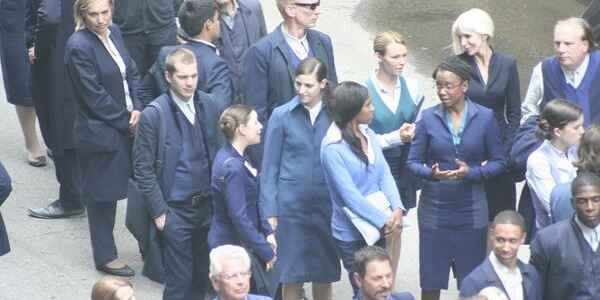
For many evangelical Christians, knowledge — in particular, the pursuit of higher knowledge — equates to apostasy. For many Christians, to attend a public university is to give yourself over to corruption by liberal, intellectual elitists. This anti-intellectualism ties in largely to evangelicals’ belief in Young Earth Creationism. Science and, by extension, scientists are full of lies from the King of Lies. That’s no joke: evangelicals distrust and dismiss science and its proponents as deceptive agents of Satan.
The Erudite faction represents these liberal, scientific elites of conservative Christian lore. Their leader, Jeanine Matthews, represents the gradual usurpation of Christian Dominionism — more on that in a minute — by liberal politicians. Matthews believes knowledge, not selflessness, should rule society, and she sets her sights on taking political control and wiping out Abnegation entirely.
Anti-Christian purges, similar to the one Matthews attempts to carry out on Abnegation, are the subject of constant fearmongering among conservative Christian talking heads. First they come for the Ten Commandments plaque in the courthouse, then they want to behead you.
Dauntless, Like War, Are a Neutral Force
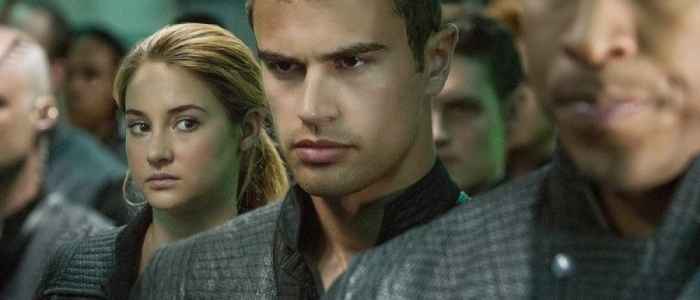
In the beginning, Dauntless are working for the hyper-Christians in Abnegation. They’re known for their bravery, because they make up Chicago’s military and police force. No one really complains about Dauntless brutality, because the faction works under the direction of Abnegation, so they’re agents of saintly goodness.
Once Matthews and Erudite take over, however, Dauntless becomes nothing but a drone army. Except for Tris and Four — who are former Abnegation members, and are therefore protected by their Christian salvation — all of Dauntless are forced to carry out the Erudite mission to purge Abnegation from the city.
This is because, in Divergent, the Dauntless faction doesn’t represent actual people. Technically, Abnegation and Erudite don’t either; the people they claim to be based on in real life are myths. But Dauntless doesn’t represent anything human. Instead, they’re an abstraction of war. Evangelicals — Roth included — believe that a war can be just, depending on who’s fighting it.
Now that you have a good idea of just how allegorically fucked the characters are, let’s move on to the story itself.
Divergent Begins with Christian Dominionism
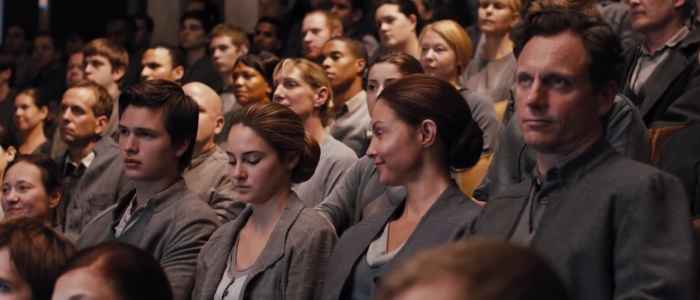
When the film begins, all but one of Chicago’s governing leaders is Abnegation. This is Christian Dominionism: the idea that only Christians are people. More specifically, it’s an outlook in which belief in protestant Christianity is the number-one criterium needed to hold public office, occupy leadership and management roles, and even gain citizenship.
You’ve seen Christian Dominionism at work in the U.S., even if you didn’t realize it at the time. Regardless of whether you believe President Barack Obama is a Christian or a Muslim — or even an athiest, as Bill Maher has it — you cannot deny the fact that hopes of political success would force almost any non-Christian into lying about his belief system in order to obtain it. Then there’s the debate over whether to ban Muslims from entering the U.S., which has found support among political candidates and voters alike, despite being 100 percent in violation of the 1st Amendment.
Divergent asks us to believe that this is the best way to govern: with the incorruptible selfless to lead. It ignores the fact that everyone is corruptible, regardless of faction or religion.
It Continues with Evangelical Christian Paranoia
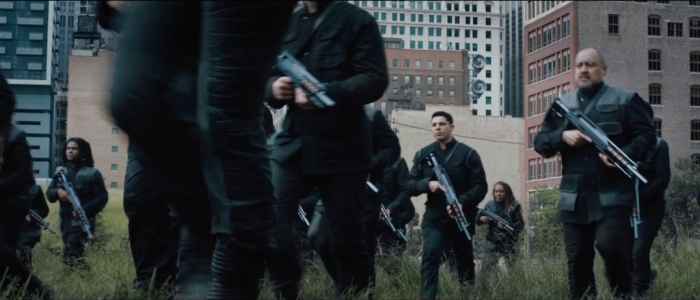
Evangelical Christians grow up hearing one constant message from the pulpit: Everyone is out to get you. Not only does the devil want to jerk you off your straight-and-narrow path, but society at large wants you dead and silenced. Among your enemies are Disney, HBO, and Harry Potter.
The running theme in these persecution narratives is the idea that, any day now, the U.S. will become an anti-Christian reboot of Nazi Germany. One day the men in black boots will show up at your doorstep to shove you into boxcars and haul you off to FEMA camps, because literally everyone who isn’t a Christian wants you and your belief system dead.
No, I mean that. If you aren’t a Christian, you won’t support Christians in the post-Rapture world, because the Devil and all his agents will be able to trick you into believing that your neighbors are a threat to society. Kind of like how all the Dauntless who weren’t Abnegation went RoboCop on Matthews’ orders. There’s no free will for non-Christians/non-Abnegation in this scenario, because…
Augustinian Theodicy Creates a Paradox
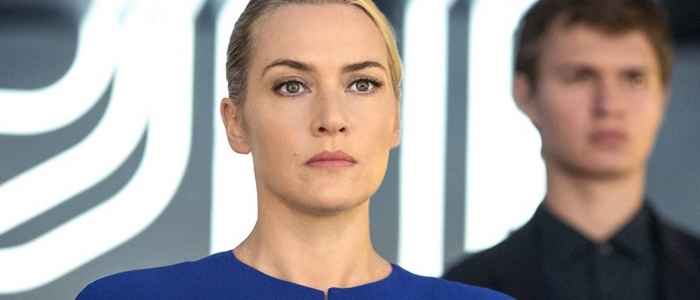
Sometime in the 4th or 5th century, St. Augustine argued that 1) all humans have free will, but 2) evil and suffering exist because humans are not exercising their God-given free-will in the right way, and therefore 3) the Church — and State — should exercise poorly-acting humans’ free will for them to make sure that they make the right decisions. It’s for the greater good, obviously.
This is, of course, Erudite’s mission. Forget government-of-the-selfless: Matthews wants government-of-the-intelligent. Which, if we’re being honest, is really not a bad idea. But remember that Divergent is novelized Christian paranoia, and that the idea that knowledge should be a criterium for having power flies in the face of Christian Dominionism.
The paradox comes in when you realize that Augustinian theodicy is, first and foremost, a Christian idea, coming out of the mouths of Divergent’s allegorical atheists. The good news is that the paradox explains itself, once you realize that…
Divergent Is All about How Catholics Are Bad

In many brands of evangelical apocalypticism, the Antichrist — or Beast, as he’s often called — is said to have strong ties to the Roman Catholic Church (RCC). The rationale behind this argument comes from Revelation 17:2-4:
(3) And he carried me away in the Spirit into a wilderness; and I saw a woman sitting on a scarlet beast, full of blasphemous names, having seven heads and ten horns. (4) The woman was clothed in purple and scarlet, and adorned with gold and precious stones and pearls, having in her hand a gold cup full of abominations and unclean things of her immorality, (5) and on her forehead a name was written, a mystery, “BABYLON THE GREAT, THE MOTHER OF HARLOTS AND OF THE ABOMINATIONS OF THE EARTH.” (New American Standard Bible)
The purple and scarlet referenced in the passage above were the colors of Rome in antiquity, and are the colors of the RCC today. The fact that Revelation author John of Patmos was writing about the Roman Empire’s very real persecution of Jews and early Christians is lost on those evangelical apocalypticists, who view the Book of Revelation as a prophecy awaiting fulfillment.
And did I mention that that prophecy includes Christian-hunting, just and unjust wars, and marking one’s allegiance to either the Christian God or the Antichrist? Because, yeah, that’s there, too.
On the surface, Divergent is about a young woman learning to be strong and embrace her uniqueness as her world falls apart around her. And it would be decent … if it wasn’t a transparent surface. Instead, all we’re left looking at is the same old story of evangelical paranoia, retold.
What do you think? Leave a comment.











Chicago is such a gorgeous city, and to see it transformed into a futuristic wasteland was incredibly cool.
I took away from it the theme of reconciling all parts of oneself into the whole: Humans can be brave, cowardly, selfish, selfless, honest, and deceitful all at once. The whole point was that the human condition isn’t black and white, but many shades of grey.
I have a love-hate relationship with the divided factions idea. As cool as it was, it wasn’t done very well.
This movie reminds me a lot of Logan’s Run.
This movie was tolerable. There is an interesting premise that could have been handled…. Much better
If you wanna enter a new world that is very close to our real one, this is the one.
I love YA distopian fiction, and “Divergent” was a fun brainless vacation, but it also clearly contained a disturbing brand of Christian allegory.
This is the kind of article my English teacher would have loved, finding all sorts of symbolism.
I didn’t get the Christian overtones when I read the books and watched the movie. I just thought they were badly written.
I didn’t get this at all from the films but I didn’t read the books. I would love for you to elaborate on the Catholic part. I don’t really get how that connects to Divergent…
You have made an effective argument of how Divergent is substantially different from The Hunger Games. Good Job.
This was very informative. Thank you for writing it. I am a self-taught scholar of the Bible, Christian history and early theology. I have a degree in theology fromthe University of Windsor in Ontario. These trends in post-millenial thinking are disturbing because they attract people who don’t want to think or do research for themselves. Like all facistic thinking it makes sense on the surface and , hey, who’s got a shovel to dig deeper with. Sharon Goodier
The movie is awesome for me (I’m totally obsessed).
This film is the same old played out, clichéd, macho man is tough on girl then helps girl then falls in love with girl with an extra side of smart mouthed bullying jerk bullying said girl film.
I was just looking for an analysis of this sort of this movie as some of my students have been talking about the film. Thank you.
I enjoyed Divergent and just finished Insurgent. It seemed to me to be along the lines of Hunger Games meets Harry Potter. I didn’t miss the darker worldview of The Hunger Games – but I did miss the presence of fully developed adult characters that are found in HP. I am encouraged to see another series with a female protagonist who is portrayed as smart, strong, and a person of character. Tris does seem more mature than would be expected of a 16-year-old, but that’s not a bad thing!
I love this post so much. My path is divergent.
An interesting interpretation. Personally, I disliked the Divergent series, but your analysis was compelling. My friend loves this series, so I’ll be sure to share this article with her. Well done!
Absolutely loved the soundtrack to this movie, one of my favorites personally.
I loved the first two!
Really interesting article! The part I’m curious about is how the other factions play into this allegory. What roles do Amity and Candor play?
I haven’t read a lot of YA (I tend to read classics, Christian fiction and middle grade fiction – I think that is the right term!), but I love The Hunger Games series! A friend is going to lend me Divergent and its sequels and now I am even more excited to read them than I already was!
I never thought about looking at it through a Christian lens. Thanks for sharing your thoughts!
This article is very interesting and well thought out. I’d like to know how the other factions relate to this. What would be the significance of Amity or Candor? Those are the two factions I relate to the most.
Wow, thank you for this. What a fascinating development in the capitalization on the “destiny” complex of Hollywood (an extension of Western discourse in general). Has anyone read the book Blood Sacrifice and the Nation: Totem Rituals and the American Flag? American civil religion is a powerful thing. These same themes of destiny are why Avengers: Age of Ultron fell through in the end for me.
I can honestly say I have never considered any of your analysis when reading these books (granted I was a lot younger). Kind of tempted to reread them to look for elements of what you have found. Really, really interesting article!
Sorry, your analysis kind of falls apart if you actually read the books without looking for ways to criticize a Christian writer. The leader of your Abnegation, which you claim represents some idealized Christian utopia, is repeatedly and quite strongly pointed out as a child and wife abuser who was protected by the other leaders.
I think that the book was expresses the more honest Christian perspective that we are a combination of facets and that no one aspect can be absolute while remaining pure